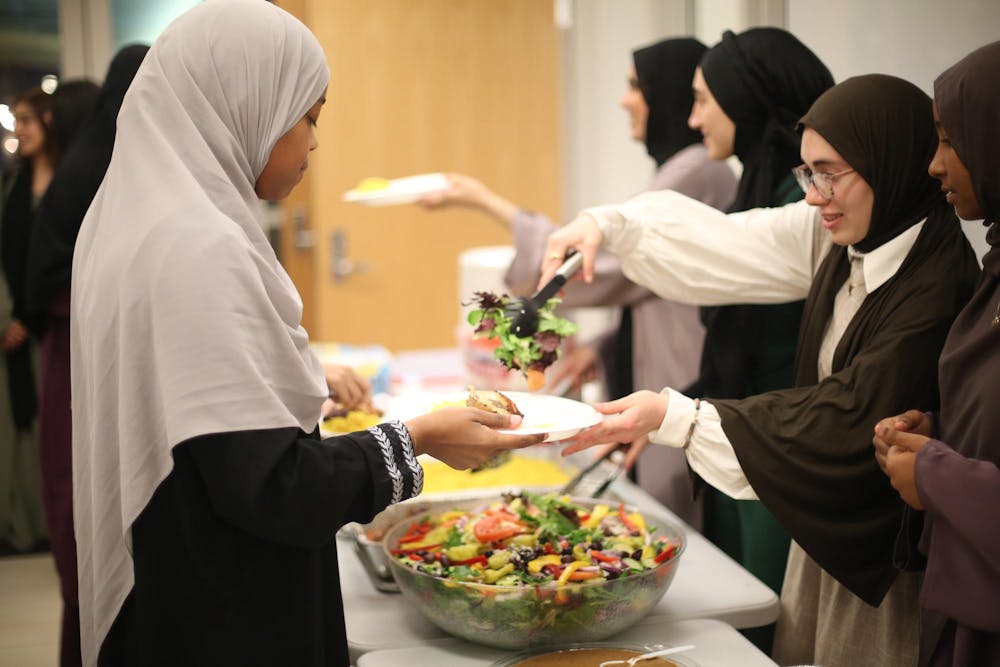“Why use harmful rhetoric like that?” he said. “Why make comments that encourage people to think hatefully?"
Weeks later, on Franklin Street during the weekend of Halloween, a hijabi student said she was attacked by someone wearing an Israeli flag and wielding a knife. The president of the Muslim Student’s Association, Nawfal Mohamad, said he knew the victim personally. He said he thinks about the danger that specifically his hijabi members might face as he makes decisions about the club.
Bayraktar echoed that sentiment, saying that during graduation some of their members — especially those wearing hijab — were harassed and yelled at. The organization has been taking extra efforts, she said, to take care of their community since then.
“We made a group chat to be able to provide rides to people at night, so that people don't walk alone, especially hijabis, who are visibly Muslim,” she said. “Also in case of any attacks, any feeling of discomfort, we could be notified more quickly. We formed that community in response to what happened.”
Advocating peacefully
Representatives from these student groups say they’ve done their best to advocate in ways they feel is appropriate and won't put their community members in danger. Last week, MSA hosted their annual event "MSA Live" featuring a guest speaker who worked as a doctor in Gaza for three weeks this summer, and ASO has also organized various events and fundraisers. Along with their explicit advocacy, Ibrahim said the group has also been organizing more social and cultural events this year.
“Often we're associated with the center of conflict and that's really not the case,” he said. “We have amazing people and beautiful traditions and amazing food — it's really important that we highlight all of those things, and not just the conflict or the danger or the political strife.”
With all of those events, Ibrahim said members of their organization, and also their largely Palestinian executive board, are always thinking about the conflict and ways they can help.
“Palestine is in our hearts and our minds, in every second of the day, every day,” he said.
A first-year representative from the organization, whose family is of Palestinian descent, said deciding how to protest is a difficult choice, and that the organization is very careful knowing there’s an increased safety risk for their community.
“We're all very hard supporters, but the way we like to organize and demonstrate is peacefully,” she said. “We have to showcase ourselves in a way that doesn't seem like deterring or threatening to other people.”
Mohamad also talked about the way in which their advocacy for Palestine could put their organization's other functions at risk.
To get the day's news and headlines in your inbox each morning, sign up for our email newsletters.
“Every decision we make, we have to make sure that it won't put MSA in harm's way,” Mohamad said. “Whether that be the administration looking down upon us, or even disbanding us. We never want anything like that because at the end of the day, without the MSA here, there is really no Muslim life on campus.”
The walkout
To many students, the walkout on Sept. 19 and the day's vandalism represented an escalation of these existing tensions.
"The things that happened at walkout, the vandalism and some of the messages that were spray painted, give a negative look on Muslims and Arabs — even if they are not done by Muslims or Arabs — because a lot of people can't really differentiate," Bayraktar said.
The first-year representative from ASO said she was very conflicted about these actions, because she understands why protesters would find escalation necessary at this point in the war.
“I think it's easier to put on the keffiyeh and grab a spray paint when you can just take it off and go on about your day,” she said. “But then again we really, really appreciate the people helping to support our cause.”
Ibrahim said he worries about the administration using the events of the walkout to punish the larger community of students who support Palestine but had nothing to do with the vandalism.
"There's so many people in so many different groups who are vested in this cause and are attempting to make things better," he said. "To link a cause with one group of people is extremely ignorant. It's shrinking. It's an attempt to shrink and reduce and undermine the efforts being taken against this whole systemic problem."
A representative from SJP said the concerns of the student groups are valid, but they also don't represent all students.
"We have a lot of respect for all the work that MSA and ASO do, but this opinion, while might reflect maybe the executive board, does not necessarily reflect these organizations fully," they said. "They do not speak fully on behalf of the Muslim and Arab students on campus. Their opinions are very valid, and they are something we are considering and looking at, but they're not the only opinion, coming from Muslim and Arab students."
@_aishabee_
enterprise@dailytarheel.com
Aisha BaiocchiAisha Baiocchi is the 2024-25 special projects editor. She previously served as the 2023-24 enterprise managing editor and a senior writer on the University desk.




